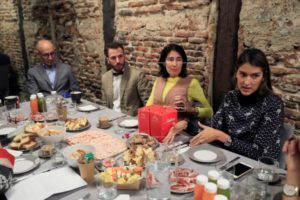¿Qué es la Slow Fashion?
‘Slow Fashion, ¿el nuevo lujo?‘, así se titula el artículo de Agencia EFE donde ACME -Asociación de Creadores de Moda de España, Pepa Bueno, Modesto Lomba, Leandro Cano, Margarita y Valentina de ES Fascinante y Luis Torres de Bowtery pudimos hablar sobre este nuevo concepto que suena últimamente más que nunca como “moda que respeta el medio ambiente”. Fue durante el desayuno “60 minutos de moda con EFE Estilo” en Madrid, al que fuimos invitados como artesanos que hemos aplicado técnicas tradicionales de la alfarería a nuevas creaciones de moda. Pero, ¿qué es en realidad la slow fashion?
‘Slow Fashion, the new luxury?, this is the heading of the article of Agencia EFE where ACME -Asociación de Creadores de Moda de España, Pepa Bueno, Modesto Lomba, Leandro Cano, Margarita and Valentina from the shop ES Fascinante and Luis Torres from Bowtery could discuss about this new concept which seems to be a buzzword meaning fashion which is eco-friendly. It was during the breakfast “60 minutes of fashion with EFE Estilo” in Madrid, which we were invited to as artisans who use traditional pottery techniques on new fashion creations. But, what is slow fashion actually?
‘Slow‘, ‘lento’ en inglés, aplicado a la moda, se refiere no sólo al hecho de que el consumismo no sea tan rapido y, por consiguiente, no genere tantos residuos. Es también un término ligado a la forma de hacer, de crear, y de entender la moda. En palabras de Modesto Lomba, presidente de ACME, la slow fashion requiere de las características de la artesanía: tiempo y conocimiento. ¿Y qué es lo más valioso que tenemos en nuestros tiempos? El tiempo. Por eso Leandro Cano considera que la Slow Fashion, la artesanía en general, se puede definir como el nuevo lujo.
Slow, as applied to fashion, stands for not only the fact that the consumerism is not that fast and, consequently, does not generate much waste. But it is also a term linked to the way we create things, the way we understand fashion. As Modesto Lomba, president of ACME, said, slow fashion requires the main features of craftmanship: time and knowledge. And what is the most valuable thing nowadays? Time, it is. That is why the Spanish designer Leandro Cano considers that Slow Fashion and craftmanship in general can be defined as the new luxury.
Margarita Ruyra, de ES Fascinante, coincidió con nuestro ceramista de La Rambla Luis Torres en que el revindicar la artesanía como forma de hacer las cosas en la moda no sólo era importante por el valor medioambiental y la calidad de los productos en sí, sino porque la artesanía además es un sector que fomenta el empleo intrafamiliar, los conocimientos de padres a hijos, y que aporta un valor cultural y patrimonial a las prendas y a los lugares donde se realizan. La globalización está acabando con la cultura local, la artesanía mantiene eso que hace a un lugar distinto del otro y, por tanto, atractivo.
Margarita Ruyra, from ES Fascinante, an online shops which sells Spanish Slow Fashion, agrees with Luis Torres, our ceramist from La Rambla, that reclaiming craftmanship as the way to make fashion is important not only because of its environmental value, but also because it improves the local economy as artisans inherit their business from their parents; and because craftmanship provides a cultural value to the cities and countries which makes them different from eachother. Globalization is destroying the local identities and, eventually, their tourist attractions.
Pepa Bueno, directora ejecutiva de ACME, insiste en el hecho de que la slow fashion es respetuosa con el medio ambiente, algo que en el mundo de la moda no es tan habitual. Y Valentina Suárez-Zuloaga, co-fundadora de ES Fascinante añade que hay que saber vender este concepto y acercarlo al público, y este valor medioambiental es un buen recurso para acercar la moda de calidad a las nuevas generaciones. Además, reivindica Valentina que los creadores deben estar adaptados a las nuevas formas de venta, al nuevo público, para que al final la ropa de calidad acabe vendiéndose y siendo rentable, que es de lo que se trata.
Pepa Bueno, the head manager of ACME, insists on the fact that slow fashion is ecofriendly, something that does not always happen in the world of fashion, one of the most polluting industries. And Valentina Suárez-Zuloaga, co-founder of ES Fascinate, adds that fashion designers should know how to show this concept to the public, as this environmental value is a good resource to bring slow fashion close to the new generations. Furthermore, Valentina suggests that creators should addapt to the new ways of shopping so that these clothes are finally easy to buy and are profitable for their makers.
En lo que nosotros coincidimos con toda la mesa es en que los consumidores nos hallamos en continua contradicción, como aseguraba Modesto Lomba: queremos ser respetuosos con el medio ambiente por un lado, pero compramos de forma irresponsable por otro, pasando por alto las consecuencias sobre nuestro entorno, los derechos laborales básicos y la calidad de lo que consumimos. Por eso, es necesaria una educación del consumidor al respecto.
We all agreed that consumers nowadays are in a continuous contradiction: on the one hand, we want to care our environment; on the other hand, we buy in an irresponsible way, not taking into account the consequences for our climate, the labour laws or the quality of the products. That is why consumers need to be informed and educated about this.

